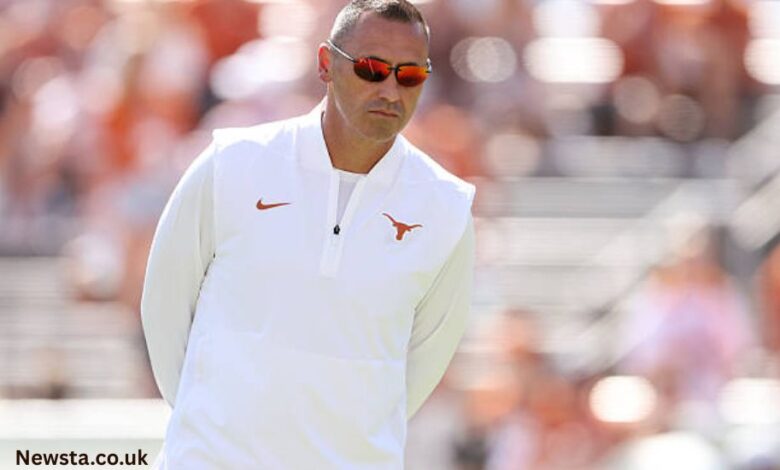Steve Sarkisian: From Quarterback to Coaching Luminary — and the Woman Beside Him

Stephen “Steve” Ambrose Sarkisian’s journey through the ranks of college and professional football is a story of perseverance, reinvention, and redemption. Today, he’s best known as the head coach of the Texas Longhorns, leading one of college football’s most storied programs into the demanding SEC. But beyond the playbooks and press conferences, Sarkisian’s life reflects deep resilience, personal trials, and a partnership that has shaped his evolution both on and off the field.
This article explores his full arc — from player to coach, from controversy to comeback — and the personal dimension that includes his wife, family, and the woman who stands beside him today
Early Life and Playing Career
Steve Sarkisian was born on March 8, 1974, in Torrance, California. The youngest of seven children of Armenian and Irish descent, he grew up in a hardworking, Catholic household that emphasized discipline and humility. During high school, Sarkisian excelled in both baseball and football but was overlooked by major college programs due to his size.
Determined to pursue football, he attended El Camino College, a junior college near his hometown. There, he blossomed into an exceptional quarterback, earning junior-college All-American honors and catching the eye of Brigham Young University (BYU). At BYU, under coach LaVell Edwards and offensive coordinator Norm Chow, Sarkisian thrived in the Cougars’ high-flying offense. In 1996, he threw for over 4,000 yards and 33 touchdowns, winning the Sammy Baugh Trophy as the nation’s top passer and leading BYU to a 14-1 record and a Cotton Bowl victory.
After college, Sarkisian played professionally in the Canadian Football League (CFL) for the Saskatchewan Roughriders. His playing days were brief — marked by promise but inconsistent results — and by 1999, he retired to pursue coaching full-time.
Coaching Ascent: USC, Washington, and Early Challenges
Sarkisian began coaching in 2000 at El Camino College, where he tutored quarterbacks before joining Pete Carroll’s staff at the University of Southern California (USC). He quickly became known as a sharp offensive mind, rising from quarterbacks coach to offensive coordinator. His mentorship helped develop some of USC’s greatest passers during its early-2000s dominance.
In 2004, Sarkisian briefly moved to the NFL as the Oakland Raiders’ quarterbacks coach before returning to USC. His collaboration with Norm Chow and Pete Carroll produced dynamic offenses that won national championships and propelled several players to the NFL.
The Washington Years
In 2008, Sarkisian accepted his first head-coaching position at the University of Washington. He inherited a winless team and began an arduous rebuild. Within a year, he led the Huskies to a victory over No. 3-ranked USC, signaling a turnaround. Over the next five seasons, Washington consistently improved, achieving multiple bowl appearances. Critics nicknamed him “Seven-Win Steve” for his string of 7-6 seasons, but his work laid the foundation for Washington’s eventual resurgence
Return to USC and the Storm That Followed
In 2013, USC hired Sarkisian as its head coach, returning him to the program where he had once been an assistant. The expectations were immense — restoring USC to national power status. Initially, things looked promising: he recruited well and implemented a fast, aggressive offensive system.
However, by 2015, troubling signs emerged. Reports surfaced of unprofessional behavior and possible alcohol issues. In October of that year, USC placed Sarkisian on an indefinite leave of absence after he reportedly arrived at practice intoxicated. Days later, he was terminated.
The firing became a national story and marked a painful public fall. Sarkisian later filed a wrongful-termination lawsuit, claiming the university failed to accommodate his efforts to seek treatment. The episode forced him to confront personal struggles that had long lingered beneath his professional success. He entered rehabilitation, took time away from football, and began rebuilding his life from the ground up.
A Second Act: Alabama, NFL, and Redemption
Nick Saban offered Sarkisian a second chance in 2016, hiring him as an analyst at Alabama. The move proved transformative. Under Saban’s disciplined program, Sarkisian rediscovered structure, balance, and purpose. Within months, he was promoted to offensive coordinator for the national championship game — and Alabama’s offense flourished.
In 2017 and 2018, Sarkisian transitioned back to the NFL as offensive coordinator for the Atlanta Falcons. The experience deepened his understanding of pro-style concepts and personnel management. Two years later, he returned to Alabama, again as offensive coordinator, where his schemes produced one of the most explosive offenses in college football history. In 2020, his offense averaged nearly 50 points per game and won the national title. That same year, he received the prestigious Broyles Award as the nation’s top assistant coach.
Texas Longhorns Era: Building a Powerhouse
In January 2021, Sarkisian was hired as head coach at the University of Texas. His mandate was clear: restore the Longhorns to national prominence. His first season, however, was rocky — a 5-7 finish that left fans skeptical. Yet Sarkisian remained calm and confident, emphasizing patience and culture-building.
By 2023, the turnaround was undeniable. Texas won the Big 12 Championship and made its first appearance in the College Football Playoff. The following year, in 2024, Texas entered the SEC and finished 13-3, reaching the conference championship game and advancing deep into the postseason. The Longhorns’ offense became one of the most feared in the nation, blending pro-style precision with spread innovation — the hallmark of Sarkisian’s play-calling philosophy.
In recognition of his success, Texas extended Sarkisian’s contract through 2030, increasing his salary to more than $10 million per year. By 2025, he ranked among the highest-paid coaches in college football. Under his leadership, Texas has built elite recruiting classes, developed NFL-ready quarterbacks, and restored the swagger that had long been missing in Austin.
Offensive Philosophy and Coaching Identity
Sarkisian’s coaching mantra — “All Gas, No Brakes” — captures his aggressive, creative, and fearless approach to football. His offenses are known for their precision, motion, and adaptability. He blends spread concepts with pro-style reads, creating mismatches that exploit defensive weaknesses.
He has coached and developed several elite quarterbacks, from Carson Palmer and Matt Leinart at USC to Tua Tagovailoa and Mac Jones at Alabama, and most recently Quinn Ewers and Arch Manning at Texas. His success lies not just in play-design but in teaching — simplifying complex schemes into repeatable, high-execution systems that empower players.
Off the field, Sarkisian emphasizes culture, unity, and accountability. His rebuild at Texas wasn’t just tactical; it was psychological. He instilled confidence in a program long burdened by unmet expectations. His calm demeanor, once questioned, has evolved into quiet authority — a balance of intensity and empathy forged through personal experience.
Personal Life: Family, Marriage, and the Woman Beside Him
While Sarkisian’s football career has dominated headlines, his personal life tells its own compelling story of love, change, and resilience.
First Marriage: Stephanie Sarkisian
Steve Sarkisian married Stephanie Sarkisian in 1997. The couple shared nearly 18 years together and had three children — daughters Ashley and Taylor, and a son, Brady. Stephanie, known for her discretion, largely stayed out of the public eye, focusing on family and supporting Steve’s demanding coaching career.
In 2015, amid growing personal pressures, Steve and Stephanie filed for divorce. The separation coincided with his departure from USC, marking one of the most difficult periods of his life. Despite the breakup, Steve has maintained a close relationship with his children, who have occasionally appeared with him at Texas events. His son Brady has even played football within the Longhorn program, extending the family legacy.
Marriage to Loreal Smith (Loreal Sarkisian)
In 2020, Sarkisian remarried. His wife, Loreal Smith — now Loreal Sarkisian — brought a dynamic and confident presence into his world. A former collegiate track-and-field athlete and coach, Loreal had her own deep ties to athletics. Over time, she transitioned into fashion and styling, becoming a popular figure among fans and media for her striking gameday outfits and magnetic charisma.
Loreal has often been referred to as the “First Lady of Texas Football.” She has redefined the image of a coach’s spouse — combining style, advocacy, and empowerment. Her professional work as a stylist, motivational figure, and philanthropist has made her a role model in her own right.
In 2025, the couple welcomed their first child together, a baby boy named Xolo, further uniting their blended family. Loreal also plays a loving stepmother role to Steve’s older children, reflecting the couple’s commitment to family cohesion despite their high-profile lives.
Their relationship has not been without challenges. In 2024, rumors surfaced of marital tension and a brief separation, but the couple later reconciled. Through ups and downs, they have remained a symbol of resilience — a partnership built on shared ambition and mutual respect.
Trials and Redemption
Steve Sarkisian’s life story is a lesson in recovery and self-belief. The public nature of his USC firing in 2015 could easily have ended his career, yet he used the moment to rebuild himself personally and professionally. His time at Alabama not only restored his reputation but also grounded him in humility and discipline.
At Texas, he often speaks about second chances, leadership through empathy, and building environments where players can learn from mistakes — lessons clearly drawn from his own journey. Sarkisian’s transformation from embattled coach to respected leader mirrors a larger truth about perseverance: failure is not final unless you stop trying.
Current Legacy and Future Outlook
Today, Steve Sarkisian stands as one of the most respected minds in college football. His teams are known for their creativity, competitiveness, and composure. He has proven that redemption is not only possible but can lead to excellence.
At Texas, Sarkisian’s influence extends beyond the field. He has stabilized recruiting, fostered stronger relationships with alumni and boosters, and positioned Texas as a perennial contender in the new SEC landscape. Off the field, he advocates for fairer NCAA eligibility rules and mental-health awareness among athletes — issues deeply tied to his personal evolution.
The future looks bright for Sarkisian and Texas. With elite recruits, national visibility, and institutional confidence behind him, the coach who once fell from grace has engineered one of college football’s most remarkable comebacks.
Conclusion
Steve Sarkisian’s story is far more than a sports narrative — it’s a chronicle of human resilience. From a junior-college quarterback overlooked by major programs to one of the highest-paid coaches in America, he has lived through failure, redemption, and renewal. His journey has been defined by persistence, learning, and the power of support — especially from the women in his life who have stood beside him during triumph and turmoil.
Through the lens of his personal and professional life, Sarkisian’s evolution reflects a universal truth: success is rarely linear, and greatness often emerges from adversity. As he continues leading Texas into new heights, the partnership between Steve and Loreal Sarkisian stands as a modern story of strength, unity, and purpose.
For more sports stories, personal profiles, and inspiring journeys like this one, visit Newsta — your source for insightful, balanced, and human-centered storytelling.
Thanks for read our article if you want more like this kind of article visit our site Newsta, and comment us. We provide authentic & comprehensive information to our readers.



